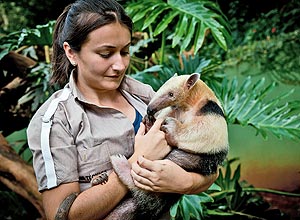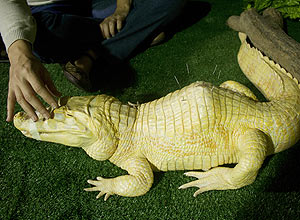Latest Photo Galleries
Brazilian Markets
17h39 Bovespa |
+0,74% | 125.124 |
16h43 Gold |
0,00% | 117 |
17h00 Dollar |
-0,97% | 5,1993 |
16h30 Euro |
+0,49% | 2,65250 |
ADVERTISING
Pills, Acupuncture, Live Rabbits: When Zoo Animals Need Psychotherapy
08/19/2013 - 09h39
Advertising
CHICO FELETTI
FROM SÃO PAULO
When Jorginho wakes up in the morning, he has a breakfast of fruits and yogurt to get his bowels moving. Then he takes an anxiolytic to ease the worries of a stressful day ahead in the big city. Around the corner is Bino, who has a weekly session of acupuncture on his back, as well as a relaxing massage to deal with the pain caused by scoliosis and lordosis.
Jorginho and Bino would be just two common overwhelmed fellows living in São Paulo, if they didn't happen to live at the zoo. Jorginho is a tamanduá, an anteater mammal native to South America with a long snout and narrow tongue. Bino is an albino alligator from Pantanal, a large swamped area in central Brazil.
| Patricia Stavis |
 |
| Jorginho could have joined the 45% of Brazilian humans who have used medication for depression or anxiety, according to a study last year. |
They live in São Paulo Aquarium, which is actually a zoo, despite the name. Eight years since opening, this unique urban habitat has about 300 species of animals. "All of them are here for a very sad reason," says biologist Laura Ippólito.
These animals are undergoing a therapy called "enrichment," which simply means providing play and activities to help them deal with boredom. "Isolated animals tend to have a stereotyped behavior. Some of them practice auto-mutilation," says biologist Bruna Schwarz.
The five bugios (howler monkeys), known in nature for screaming out loud and throwing excrement, are quiet here. For all these animals, captive breeding means they will not be able to return to their homes.
Animals rights activists say zoos are the same as prison. "Not all the species are there to be saved," says activist Hélio Aron. "Some were purchased for exhibition. We should see the aquarium as a company charging 40 reais (US$ 17) for entrance and turning profit out of it."
The aquarium argues the animals are there for educational purposes. "The animals are used to show what has gone bad," Ippólito says.
ANTS YOGURT, ANXIOLYTIC
Jorginho could have joined the 45% of Brazilian humans who have used medication for depression or anxiety, according to a study last year. Life has been too tough for this orphaned tamanduá-mirim, who arrived in São Paulo after its mom died in a fire.
Rescued and taken to the aquarium, Jorginho met Lipe, a same-aged female of his species whose mom was killed by dogs. "They ate only one spoon of pap a day," says Bruna Schwarz.
Lipe has a fondness for a special brand of yogurt aimed at helping the intestines to work better. Instead of ants, this tamanduá eats a pap made of beetroot, tomato, meat, banana and spinach.
Their happiest day takes place once every two weeks, when they get a whole termite house. "They explore it the whole day, eat a lot and sleep in peace," says Bruna.
| Petala Lopes/Folhapress |
 |
| They are albino alligators born from the same mom about eight years ago. It is not a problem, though, for them to copulate with each other and become parents. Biologists say this is very common among reptiles. |
BACKACHES
Bino and Albi will soon have babies. They are albino alligators born from the same mom about eight years ago. It is not a problem, though, for them to copulate with each other and become parents. Biologists say this is very common among reptiles.
Their kids are going to be albinos. The difference is not only the color. Bino has lordosis and escoliosis, which makes him a hunchback. He suffers from chronic pain and needs acupuncture and massage to get some relief. The reptile is kept still while the veterinarian punctures its skin under the scales. Its mouth is kept closed with masking tape, just in case.
The alligators take phytoterapic medicines for pain and vitamins that compensate for the lack of sunlight exposure.
TRAUMATIZED SNAKE
Bebel, 10, is on a diet. It goes up to two months without eating a thing. Then it breaks the fast with either a 15-pound turkey or a whole rabbit - still alive.
The secret to maintain its weight is to be a traumatized anaconda.
It was taken to the aquarium after being found in the countryside breaking the bones of a calf. To force the snake, which is second in the world in size, to let the baby go, locals hit it with sticks and knives. All the violence traumatized Bebel, who did not eat for months after coming to São Paulo.
Now it has gradually started to accept a few appetizers, such as whole live ducks. After two years, it is now eating mammals again: a whole rabbit takes half an hour to be fully digested.
GOOD INTENTIONS, BAD RESULTS
As many tourists love to do, Thunder was resting under the sun on a nice Rio de Janeiro beach. But some people saw the seal, panicked and called the firefighters.
The animal was taken to the zoo. He was perfectly healthy, but after having contact with humans, it could not return to Antarctica, where it belonged. "It is dangerous because the seal could carry diseases that would affect all its peers," says biologist Marcos Helund.
After being sentenced to life in prison, the animal was offered to the São Paulo aquarium. He has wounds on his back and head because of auto-mutilation. "It hits itself against the rocks," says Schwarz. Those born free do not get used to living inside walls.
Translated by WWW.WORLDCRUNCH.COM



